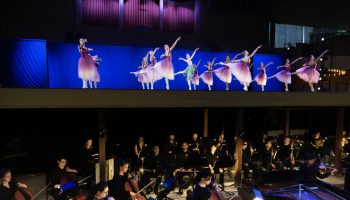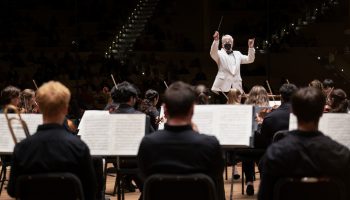NICHOLE JIANG – STAFF WRITER

Following Opening Night last week and the Independence Day Celebration Saturday, the Music School Festival Orchestra returns with its third concert of the season at 8:15 p.m. Monday, July 5 in the Amphitheater. Tonight’s program mixes lively and dramatic works that are designed to complement the smaller size of the orchestra this year.
Timothy Muffitt, conductor and music director will lead the MSFO tonight with the help of Joshua Hong, this year’s David Effron Conducting Fellow. The concert will begin with the Overture to “Ruy Blas,” Op. 95 by Felix Mendelssohn and will be followed by “Romanian Concerto” by Gyorgy Ligeti. The performance will finish with Symphony No. 9 in C major, D. 944, “The Great” by Franz Schubert.
“In a festival like this, the process is as important as the product,” Muffitt said. “The experiences that we have in the rehearsals are every bit as important as the concert. These three pieces really let us dig in in a meaningful way.”
The Mendelssohn is a dramatic piece that depicts the story of an evil nobleman who seeks revenge against a queen who banished him by tricking her into falling for and marrying his servant, Ruy Blas. When Ruy Blas’ true status is revealed, the queen is forced to denounce him despite her true feelings for him. In a fit of despair, Ruy Blas kills the nobleman with his sword and a cup of poison.
“This overture is a short and lively piece designed to get the audience’s attention,” Muffitt said. “It sets the character for whatever the drama is to follow. Mendelssohn actually invented the genre that we’re going to be playing here, which is the concert overture. It’s inspired by dramatic work.”
Hong will then conduct “Romanian Concerto.”
This piece is technically challenging for the MSFO, but Muffitt believes the work is worth it for each soloist.
“This piece features a big solo for the concertmaster and also a big solo for two of our horn players,” Muffitt said. “There are a lot of other interesting little solos as well in there, but these two really stand out.”
The concertmaster in each performance is different, as are the seating arrangements in the orchestra.
“Everybody rotates all summer long. With each concert they’re sitting in a different position to give people a variety of experiences,” Muffitt said. “It gives several people leadership opportunities.”
Muffitt is excited to close out with the Schubert piece.
“Schubert is an important part of our repertoire,” he said. “What makes it so interesting is that it’s remarkably beautiful. He really knew how to write beautiful singing melodies. He loved to compose for the voice. Even though there’s no singing in the piece, there’s a singing quality throughout. We see how important Schubert was at creating what came to be known as the Romantic style of music. He’s not often thought of as the avant-garde (today), but he certainly was the avant-garde of the first decades in the 19th century.”
This four-movement piece leaves the audience with the lasting, powerful sounds of the orchestra coming together for the finale.
“I’m the most excited for the Schubert because it’s the first time I’m performing the entire symphony as the timpanist,” said MSFO percussionist Liam McManus. “The fourth movement is definitely energetic, bright and fast. I personally never get tired of listening to it.”
As the season progresses, Muffitt said, the MSFO continues to grow together through their music on the Amp stage.
“We were thrilled with the first concert,” Muffitt said. “It’s a period of continuing growth, evolution and forming connections as people make music together. We found a remarkable cohesiveness in this first week that will continue to evolve.”




